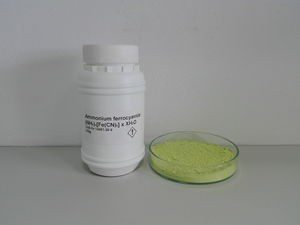Ammonium ferrocyanide
 Ammonium ferrocyanide sample (the color is a lot stronger in person)
| |
| Names | |
|---|---|
| IUPAC name
Ammonium hexacyanoferrate (II)
| |
| Other names
Ammonium hexacyanoferrate
Ammonium iron(II) hexacyanide Tetraammonium hexacyanidoferrate Tetraammonium hexacyanoferrate Tetraazanium iron(II) hexacyanide | |
| Properties | |
| C6H16N10Fe (NH4)4[Fe(CN)6] (anhydrous) (NH4)4[Fe(CN)6]·xH2O (hydrated) | |
| Molar mass | 284.10 g/mol (anhydrous) |
| Appearance | Lemon-green powdered solid |
| Odor | Odorless |
| Melting point | 95 °C (203 °F; 368 K) (decomposes) |
| Boiling point | 95–290 °C (203–554 °F; 368–563 K) (decomposition range) |
| Soluble | |
| Solubility | Insoluble in alcohols |
| Vapor pressure | ~0 mmHg |
| Hazards | |
| Safety data sheet | Acros Organics |
| Related compounds | |
| Related compounds
|
Potassium ferrocyanide |
| Except where otherwise noted, data are given for materials in their standard state (at 25 °C [77 °F], 100 kPa). | |
| Infobox references | |
Ammonium ferrocyanide or ammonium hexacyanoferrate (II) is an inorganic chemical compound with the chemical formula (NH4)4[Fe(CN)6]·xH2O. It is commonly available as hydrate.
Contents
Properties
Chemical
Thermal decomposition of ammonium ferrocyanide yields Prussian blue and finally iron(III) oxide. Cyanogen is produced during the decomposition. The decomposition occurs in several steps, and begins at 95 °C with the decomposition at 255-280 °C in air yielding ferric oxide.[1]
Heating the compound above 220 °C yields useful Prussian blue nanoparticles.
Physical
Ammonium ferrocyanide is a lemon-green powdered solid, odorless and soluble in water.
Availability
Ammonium ferrocyanide is sold by chemical suppliers.
Preparation
Ammonium ferrrocyanide can be prepared by mixing a solution of ammonium perchlorate with potassium ferrocyanide. The solution is cooled which precipitates out the poorly soluble potassium perchlorate, while ammonium ferrocyanide is recrystallized from the solution.
- 4 NH4ClO4 + K4[Fe(CN)6] → (NH4)4[Fe(CN)6] + 4 KClO4
Can also be prepared by neutralizing a solution of ferrocyanic acid with aq. ammonia:
- H4[Fe(CN)6] + 4 NH3→ (NH4)4[Fe(CN)6]
This route has the advantage of producing a very pure compound, free of any potassium impurities.[2]
Projects
- Compound collecting
- Preparation of Prussian blue (nanoparticles)
- Preparation of cyanogen
Handling
Safety
Ammonium ferrocyanide (like all ferrocyanide complexes) is stable and practically nontoxic because of the strong bonding between iron and cyanide. The dry powder may be irritant if inhaled though.
Storage
In closed plastic or glass bottles, away from sunlight.
Disposal
No special disposal is required. Discard it as you wish.
References
- ↑ https://aip.scitation.org/doi/abs/10.1063/1.4966001
- ↑ HANDBOOK OF PREPARATIVE INORGANIC CHEMISTRY, G. Brauer, 1963, 2nd Ed.